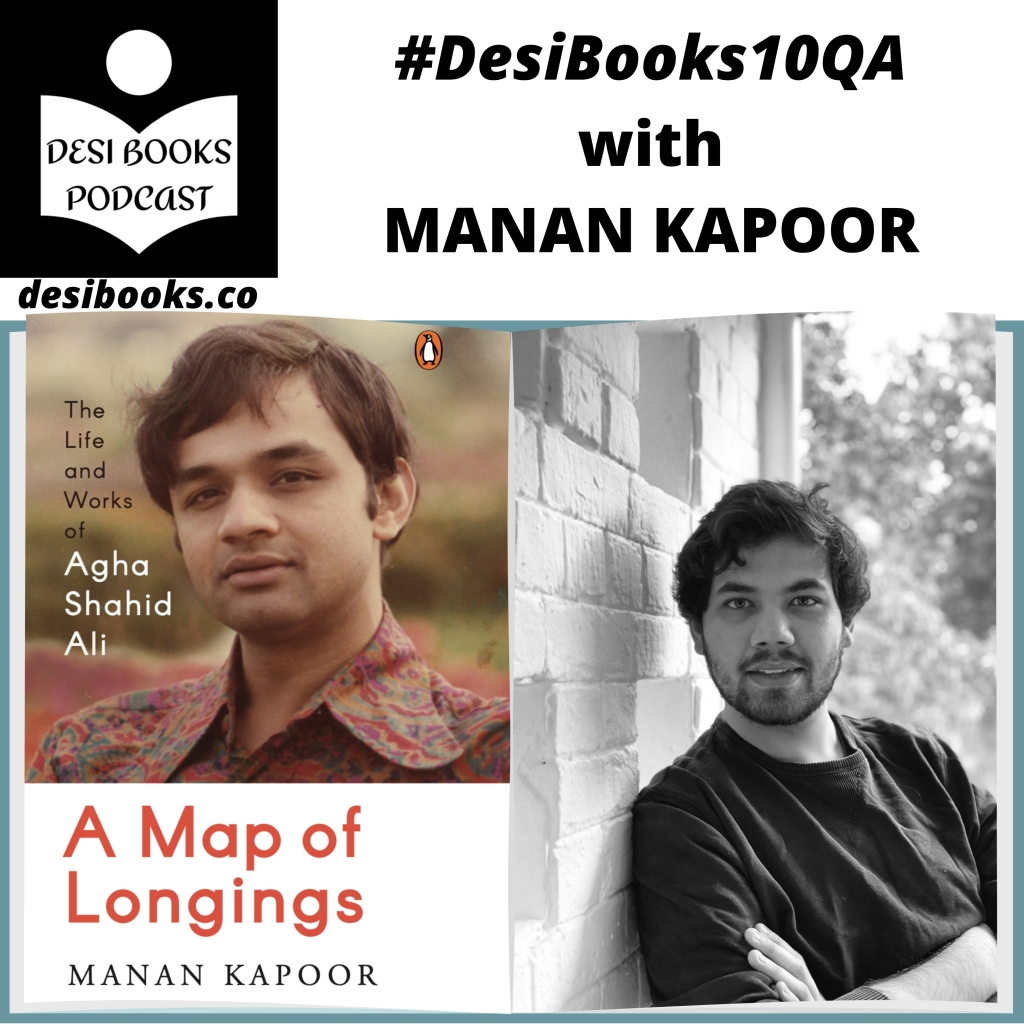
About the author:
Manan Kapoor is an Indian writer and translator. A Map of Longings: The Life and Works of Agha Shahid Ali (Vintage, Penguin Random House India) is his latest work. His debut novel, The Lamentations of a Somber Sky, was shortlisted for the 2017 Sahitya Akademi’s Yuva Puraskar. In 2019, he was a writer-in-residence at Sangam House Writers’ Residency. His writings have appeared in The Caravan Magazine, Boston Review, The Hindu, Stockholm Review of Literature, Scroll, The Wire, and Firstpost among others. He lives in Chandigarh, India.
About the book:
This first definitive biography of Agha Shahid Ali offers a rich portrait of the poet and the world he inhabited. Shahid is widely regarded as one of the finest poets from the Indian subcontinent and his works are read across the world, touching millions of lives. A pioneer of ghazal writing in English, he wrote extensively about loss, nostalgia, and home. A witness to the conflict that ravaged his homeland Kashmir, a loss he lamented in his collection The Country without a Post Office, Shahid has become a symbol of hope in a violent world.
In this biography, Manan Kapoor explores the concerns that shaped Shahid’s life and works, following in the footsteps of the ‘Beloved Witness’ from Kashmir to New Delhi and finally to the United States. He charts Shahid’s friendships with figures like Begum Akhtar and James Merrill and looks at the lives the poet touched with his compassion and love. He also traces the complex evolution of Shahid’s evocative verses, which mapped various cultures and geographies, and mourned injustice and loss, both personal and political. Drawing on various unpublished materials and in-depth interviews with Shahid’s family, friends, students, and acquaintances, Kapoor narrates the riveting story of a major literary voice and presents Shahid’s poetic vision, revealing not just what he wrote but also how he taught the world to live.
This first definitive biography of Agha Shahid Ali offers a rich portrait of the poet and the world he inhabited. Shahid is widely regarded as one of the finest poets from the Indian subcontinent . . . ~Manan Kapoor on #DesiBooks10QA .@DesiBooks
Tweet
1. The desi book that made you want to be a writer (or changed your life.)
Arundhati Roy’s The God of Small Things, Amitav Ghosh’s The Shadow Lines, The Hungry Tide, and The Glass Palace were the books that spoke to me at a very young age. There are so many others like Rohinton Mistry’s A Fine Balance and Kiran Desai’s An Inheritance of Loss that made me want to become a writer. And, of course, there was always the presence of the poetry of Agha Shahid Ali, Arun Kolatkar, A.K. Ramanujan, and so many others that massively influenced me in my early teens.
2. The desi book that your own latest book is most in conversation with and why.
It has to be A.K. Ramanujan’s Journeys: A Poet’s Diary, edited by Krishna Ramanujan and Guillermo Rodríguez, which provides an insight into Ramanujan’s life and his writing process. In so many ways, it helped me understand this hidden, often invisible world of a poet.
3. The desi book that doesn’t exist (to your knowledge) but you’d love to read.
Ah! A few months ago I was reading Rebel Music: Race, Empire, and the New Muslim Youth Culture by Hisham Aidi (which is a brilliant account of music subcultures among Muslim youth across the world) and wondered why there is no book that traces the history and evolution of Indian contemporary music, which I think is extremely interesting. Naresh Fernandes’ Taj Mahal Foxtrot covers Bombay’s jazz era, but I’m often left wondering why there haven’t been any attempts (to my best knowledge) to document the evolution of music and the subcultures that have emerged in India, especially over the last three decades. I know that the music journalist Bhanuj Kappal is writing a book about Indian rap and hip-hop and that’s one book I’m looking forward to reading.
“…there was always the presence of the poetry of Agha Shahid Ali, Arun Kolatkar, A.K. Ramanujan, and so many others that massively influenced me in my early teens.” ~Manan Kapoor on the desi books that influenced him #DesiBooks10QA .@desibooks
Tweet
4. The desi book that you’re currently reading or planning to read soon.
I’m currently reading Anuk Arudpragasam’s A Passage North. Next on my list are Salman Rushdie’s Languages of Truth, and Girish Karnad’s memoir (translated by Srinath Perur), This Life at Play.
5. The desi book that you believe is most under-appreciated and why.
I don’t know if it is truly under-appreciated , but I feel that Vikram Seth’s An Equal Music deserves more readership. I remember reading it in my early teens, in my mid-teens and the last time I reread it was two years ago. To me, it is one of the most beautifully written novels but I’ve never understood why it’s not talked about as much as I believe it should be.
6. What’s the best writing advice you’ve ever received?
Peter Stone’s interview with Gabriel Garcia Marquez for the The Paris Review is what I find myself returning to all that time, especially when I feel lost. Each time I read that interview, I gain something, learn and realize something new. I’ve learned more from reading interviews of writers and poets rather than maxims, which I think most writers make up as they go.
7. While writing your latest book, how did you keep yourself motivated to keep going despite setbacks (if any)?
With this biography, there was so much I wanted to know about Shahid and that kept me going. There were definitely various setbacks along the way but, as a writer, tackling them is a part of the job. I was looking forward to spending two weeks at the Agha Shahid Ali archives at Hamilton College but my visa was declined by the American embassy. Again, one has to work around it, so I found other ways to speak to his friends and get the documents that I wanted. There was a point when I realized that writing the biography itself was, in so many ways, shaping my understanding of Shahid and so I kept writing draft after draft.
#WritingTip from Manan Kapoor: “I’ve learned more from reading interviews of writers and poets rather than maxims, which I think most writers make up as they go.” #DesiBooks10QA .@DesiBooks
Tweet
8. With this latest book, what does “literary success” mean to you?
A couple of years ago, in my early twenties, my answer would have been drastically different, but I’ve come to realize that the only thing that matters is if you’re proud of your work. There’s no review or award which supersedes what you feel about your work, your book. With this biography, I can say that I am extremely proud of it and that’s all that matters to me.
9. How have larger literary citizenship efforts or the writing community helped you with this latest book?
Given that it was a biography, without the help of other writers and poets, Shahid’s family and friends, this book wouldn’t have been possible. Whether writers and poets from India or the US, they’ve all been extremely generous and have spent hours speaking with me, helping me understand Shahid’s world and who he was.
10. What would you most like readers to take away from this latest book?
I’m sure different readers from different parts of the world will focus on different aspects, given the kaleidoscopic nature of Shahid’s life and works. I think the most important aspect that all readers can come away with is Shahid’s writing process, how he grew as a poet. There’s so much to learn there. While writing the biography, I learned so much about the process of writing and growing as a writer, as a reader. Shahid was extremely dedicated to his work and young writers and poets—not just in the subcontinent, but all across the world—can learn so much from him.
“…the most important aspect that all readers can come away with is Shahid’s writing process, how he grew as a poet. There’s so much to learn there.” ~Manan Kapoor; A Map of Longings: The Life and Works of Agha Shahid Ali #DesiBooks10QA .@DesiBooks
Tweet
Manan Kapoor’s A Map of Longings: The Life and Works of Agha Shahid Ali is out now. More on his website.
NOTE: If you like the work being done at Desi Books, you can leave some appreciative feedback and sign up for the free, weekly newsletter. And please share this with other readers who might be interested. Remember: A Rising Tide Lifts All Boats.™
Join the Conversation
